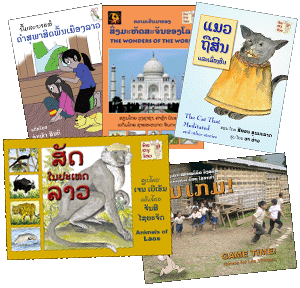 Everyone wants to learn English. For better or worse, our native
language—or, in Step’s case, one of her native languages—is in
high demand worldwide.
Everyone wants to learn English. For better or worse, our native
language—or, in Step’s case, one of her native languages—is in
high demand worldwide.Both of us love language, of course, and we’re nerds about it. Yet it does not escape us that the enthusiasm for practicing English that we’ve encountered among people in Southeast Asia is not quite about the innate beauty of the language. It’s about financial security. You can make much more money doing business in English (i.e. with foreigners) than if you do business only in Southeast Asian languages, or even in Mandarin. In the Beijing airport, for example, which we passed through on our way from San Francisco to Bangkok, all major signs are in two languages only: Mandarin and English. For now, those of us who happen to be native speakers of English have a substantial advantage when it comes to the international marketplace.
At Mae Mut Garden, as we’ve mentioned, we volunteered to assist the English teachers at the local Thai school. Each of us went, individually, on a total of maybe five or six different days over a three- or four-week span. There, assisting a young full-time volunteer teacher from the UK, we worked entirely in English with students aged nine to fourteen on a range of enigmas including the names of shapes, prepositions of space and time, and questions.
In Luang Prabang, we volunteered on several evenings as native English conversation partners at a phenomenal organization called Big Brother Mouse. If you’re ever in a position to do something like this, we seriously recommend it. It takes so little time out of your trip, and it is much more delightfully challenging than sitting at a sidewalk cafe sipping a fruit shake. (Don’t get us wrong—we did plenty of sipping, too.)
| Step interjects with a story from Mae Mut: At Mae Win Sammakee, one class we spent two hours making khao laam, sweet coconut sticky rice. It was very delicious and slightly educational. This is what my students had to tell me they were doing in English: Step 1: soak rice and black beans over night; chop up appropriate lengths of bamboo (not pictured). Step 2: mix coconut milk, sugar, and salt to taste. Step 3: stuff rice into bamboo, alternating with coconut mix. Step 4: seal with wadded-up banana leaf. Step 5: roast bamboo sticks over roaring fire. Step 6: arduously peel with mean-looking knife. Step 7: eat so much you feel sick. |
 Started in the early 1990s and aimed
at improving literacy throughout Laos, Big Brother Mouse’s primary
concern is providing entertaining, engaging books—mostly in Lao,
some in both Lao and English—to children throughout Laos,
especially in rural areas. The organization has written and
illustrated almost all the books themselves. They hold book parties
in rural classrooms, where they read a book aloud and let each child
choose a book to keep; according to the organization, this will be
“nearly always their very first book.” As of 2013, they say, Big
Brother Mouse still held the only Lao publishing license
outside of the capital city. So the English conversation group is
a secondary, more recent offering: two hours in the morning, two
hours in the evening, depending on who shows up.
Started in the early 1990s and aimed
at improving literacy throughout Laos, Big Brother Mouse’s primary
concern is providing entertaining, engaging books—mostly in Lao,
some in both Lao and English—to children throughout Laos,
especially in rural areas. The organization has written and
illustrated almost all the books themselves. They hold book parties
in rural classrooms, where they read a book aloud and let each child
choose a book to keep; according to the organization, this will be
“nearly always their very first book.” As of 2013, they say, Big
Brother Mouse still held the only Lao publishing license
outside of the capital city. So the English conversation group is
a secondary, more recent offering: two hours in the morning, two
hours in the evening, depending on who shows up.Big Brother Mouse is located amid several guesthouses and small Lao eateries on a quiet side street just off of Luang Prabang’s main commercial stretch, not far from Ock Pop Tok. From the guidebook where we learned of the organization, we initially thought we’d be reading aloud to children. Indeed, that does seem to happen here sometimes—but all three of the times we went, it was just free-for-all conversation with primarily young adults and teenagers. Many were students at colleges and high schools in Luang Prabang, some were working citizens, and even a few novice monks came in.
We all simply sat around a long table, the foreigners evenly spaced to chat with about two to four locals at once. The challenge starts right away, with names. For me, because the names are so new, I have to repeat each one many times within a minute of learning it, or it’s gone. From there, small talk was a doorway not only into grammar and vocabulary, but into the history and desires of the students. I asked one young monk if there was anything he missed that he couldn’t do now that he was a monk. “Yes,” he said. “I would like to play football.” When I was explaining where I came from, one young Hmong man told me his older sister had moved to Minnesota. One hilarious and still unresolved conundrum came up when I foolishly used the phrase “a piece of cake” in its literal sense—to mean a slice of baked good. “Oh, yes!” said the guy I was chatting with. “A piece of cake.” He went on to ask if I meant something about lighting a fire under somebody in a hammock. He drew a picture, and it was indeed a picture of a campfire under a hammock. I racked my brains. At last he said, “Maybe... idiom.”
 |
| "Boiling machine in fuffalo" was quite delicious, and did not involve machinery. |
“You will come?” said his sister. We assured them that we would be there. Sure enough, the next night, her brother came and talked a little in English, not only with Pil but with other foreigners who had come to volunteer.
Hence, an excellent way to spend six hours of our week-plus in Luang Prabang. If you are not coming to Laos any time soon, please consider donating to the cause! Just $70 brings fifty books to fifty kids who've never owned a book before, and you'll see pictures and a report of just how much they all loved taking their books home.
 |
| "Grilled duck" on the menu left out one important word: bills. |




Its true, you are language nerds. You come from a line of language nerds. Who knew ?
ReplyDelete